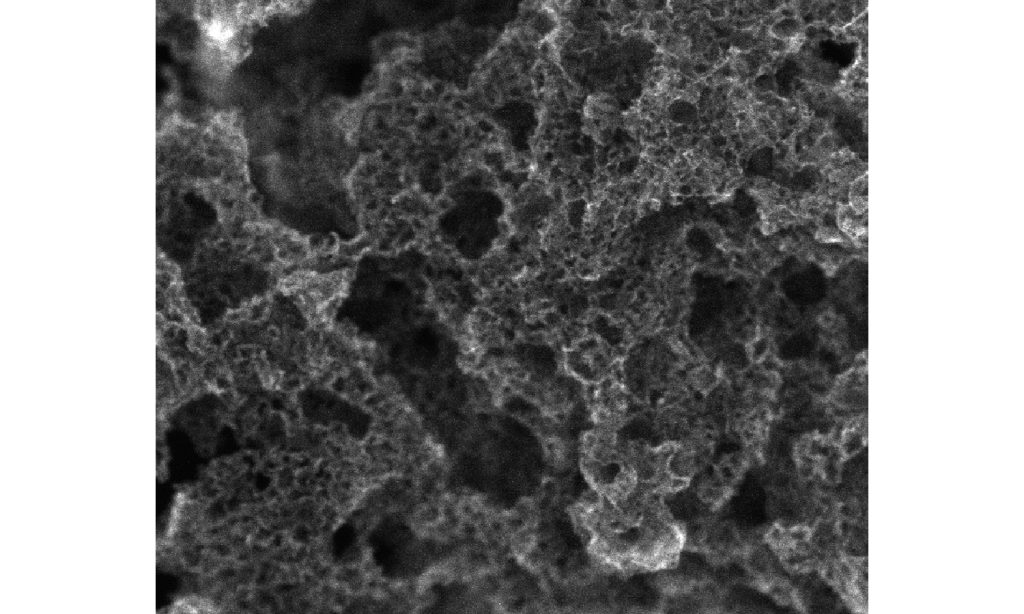Pajarito Powder part of research team improving performance of PGM-free fuel cell materials

April 20, 2020
Pajarito Powder in conjunction with a group of researchers led by Hawaii Natural Energy Institute and IRD Fuel Cells, in close collaboration with Dr. Andrei Kulikovsky just published innovative work on determinating the effect of proton conductivity on performance of fuel cells with completely PGM-free cathode, funded in part by the US Department of Energy’s ElectroCat consortium:
Tatyana Reshetenko, Günter Randolf, Madeleine Odgaard, Barr Zulevi, Alexey Serov, and Andrei Kulikovsky “The Effect of Proton Conductivity of Fe–N–C–Based Cathode on PEM Fuel cell Performance” Journal of The Electrochemical Society 167 (2020) 084501. doi: doi.org/10.1149/1945-7111/ab8825
The article is open access and can be downloaded openly at IOPScience, here.
Dr. Alexey Serov stated, “I’m very excited to share this work with the community, as findings we discovered will guide both synthetic chemists and catalyst layer designers towards bringing performance of PGM-free MEAs to level of platinum-based. The team, with funding from the ElectroCat Consortium, consisting HNEI, IRD and Dr. Kulikovsky, as well as Pajarito Powder, did a great job under and we are looking forward for the future breakthroughs in the area of PGM-free electrocatalysis.”
The commercial PGM-free material used for this study is PMF-011904, manufactured by Pajarito Powder. Team partner IRD Fuel Cells, a world leader in MEA manufacturing integrated this PGM-free catalyst into highly performing MEAs, with HNEI performing the sophisticated and comprehensive electrochemical analysis of the operating conditions within the fuel cell. Collaborator Dr. Andrei Kulikovsky developed a model that allowed to correlate fuel cell performance with different parameters affected upon it. It was shown the MEAs possess an oxygen permeability much higher than platinum-based cathodes, however low protonic conductivity is still impeding the overall performance. Using these results, the team will re-evaluate synthesis of PGM-free catalysts as well as optimize MEA preparation in order to get fuel cell performance as closer to platinum on carbon. The work was done under US DOE EERE financial support DE-EE0008419 (PI: Dr. Alexey Serov “Active and Durable PGM-free Cathodic Electrocatalysts for Fuel Cell Application”) and the team would like to acknowledge this support.
The Electrocatalysis Consortium (ElectroCat) is an initiative to accelerate the development of catalysts made without platinum group metals (PGM-free) for use in automotive fuel cell applications. Current state-of-the-art fuel cell systems rely on platinum-based catalysts that make up nearly 50% of the total fuel cell cost. ElectroCat is co-led by Argonne National Laboratory and Los Alamos National Laboratory, funded by U.S. Department of Energy’s Office of Energy Efficiency and Renewable Energy (EERE) through the Fuel Cell Technologies Office (FCTO) and is part of the HydroGen program of the Energy Materials Network (EMN).
Pajarito Powder, LLC is a domestic venture-backed startup, funded by the Verge Fund, Omphalos Venture Partners and other investors, focused on developing next-generation catalysts and catalyst supports for the fuel cell and electrolyzer industries. Working with automotive OEMs, fuel cell component companies and major electrolyzer manufacturers, Pajarito Powder is an established leader in advanced catalyst and catalyst support development in rapidly accelerating clean/green hydrogen energy industries.
Follow Us

Pajarito Powder benefits from resources provided by the State of New Mexico Economic Development Department: JTIP, STEP and other programs through the Office of Science and Technology.
